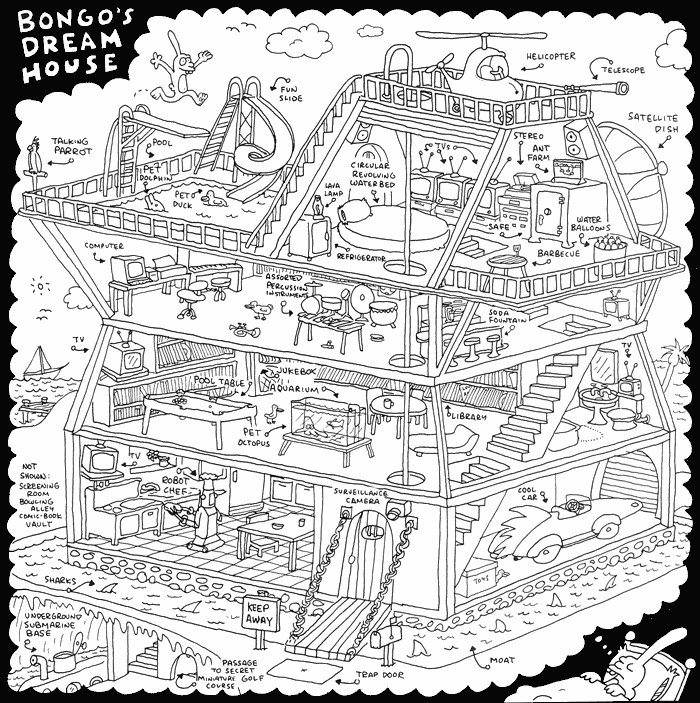Your Online Clubhouse
I've gotten in the habit of explaining Discourse to people as a clubhouse. A place on the Internet that belongs exclusively to you and your friends -- whether you have 10 friends or a few hundred thousand.
There's a big difference between a Facebook Group and having your own clubhouse. A Facebook Group is like the Teen Paranormal Romance section of Barnes & Noble. It's just a specialty area within Facebook that ultimately belongs to Facebook.

A Facebook Group doesn't really belong to you. It belongs to the store it is a part of, and you can visit all you like during business hours as long as you don't disturb the other customers, and maybe buy something every once in a while.
But when you build your own space with forum software, it truly does belong to you. You get your clubhouse, built exactly the way you and your friends wanted, with whatever rules and norms your community deems appropriate.

I was fascinated to read exactly this metaphor in Mehan Jayasuriya's NYU master's thesis Online, Underground: The Untold Story of the Original Social Media Revolution (pdf).
I came of age in Racine, Wisconsin, a rust-belt town of roughly 70,000 people that had once been a regional manufacturing hub. By the time I was a teenager, in the late 1990s, the town had fallen on hard times, its downtown filled with empty storefronts and boarded-up windows. Like most American teenagers who grow up outside of major urban areas, my friends and I spent our free time bored out of our skulls, aimlessly wandering a landscape that had little to offer us in the way of culture.
That all changed when we discovered punk rock, an art form that seemed to give voice to our suburban frustration, angst and boredom. It helped that punk culture was accessible to us in nearly every way: the music was easy to play, the CDs were affordably priced (unlike the major-label releases sold at the local mall), the shows were inclusive and cheap to attend. Soon, we were playing in punk bands, buying records via mail order and sneaking out to attend shows. There was just one problem: in order to do most of this, we had to drive to Milwaukee, the closest midsize city. Live music, to the extent that it could be said to exist in Racine, was the exclusive domain of adults, something that happened in the back rooms of a handful of dank bars. Why couldn't we have an all-ages arts space in Racine, one that could serve as the locus of our budding punk community?
There were, of course, a number of reasons why such a thing didn't exist. Luckily, being teenagers, none of us had the good sense to assess the practicality of our idea. Soon, a couple of enterprising friends had pooled together a few hundred dollars and found a landlord willing to rent a vacant downtown storefront to a group of minors. The Tokyo-A-Go-Go was born.
I can still recall the shared sense of excitement we felt once the bare-bones space -- essentially, a concrete-walled room outfitted with a cheap PA system -- was up and running. Racine bands finally had a place to play in their own hometown and local kids finally had a place to hang out, hand out flyers and political tracts and discuss the unimportant matters of the day. Best of all, it was a space that members of our community had built without any outside help and subsequently, one where we all felt a collective sense of ownership. The venue's coronation came when some touring bands from out of state scheduled a stop in Racine to play at the venue. Surely, this was a sign that we had built something of lasting value.
Of course, we hadn't. As you might already have guessed, the Tokyo-A-Go-Go didn't last very long. If I remember correctly, it was gone in a matter of weeks. To this day, there are conflicting reports about what finally did in the venue. Some say that a building inspector showed up and demanded that the place be shut down immediately. Others pinpoint the night that a kid accidentally pushed a friend through the room's front window as the moment the experiment ended (despite their initial fundraising success, the kids who ran the club were, apparently, unable to raise enough money to repair the window).
Whatever the reason for its demise, the Tokyo-A-Go-Go taught us all a valuable lesson. If the cost of building something is low enough and the benefits of building it are great enough, you can simply build it yourself. This is, of course, the equation that so many bored kids who came before had arrived at, the "do it yourself" -- or "DIY" ethos on which punk culture was built. It doesn't matter how small or how niche your community is -- if that community wants its own space badly enough, it will find a way to build it. Of course, this is easier done in places like Racine, Wisconsin where the transaction costs of setting up shop are low and the benefits, in providing a home to a community that lacks one, are high.
I was reminded of this lesson a few years later when I started spending a lot of time on online messageboards. This was the early 2000s, when it was becoming increasingly easy to find vibrant online communities dedicated to seemingly any topic. Such messageboards provided me with virtual spaces not unlike the Tokyo-A-Go-Go, places where like-minded people would congregate to discuss shared interests. However, unlike the Tokyo-A-Go-Go, messageboards allowed me to connect with people in other small towns or even big cities, to gauge what was considered cool in other parts of the country or world, to feel as if I was a part of a much larger community. It was like stepping into a stadium-sized version of the Tokyo-A-Go-Go, one that was populated by people from all around the globe.
I honestly go in expecting the worst from a lot of dry, academic studies but this one is unusually genuine and heartfelt. If you liked the above excerpt, download the PDF and give it a deeper read.
Mehan's history of the online messageboard captures a lot of what I love about the Discourse project, and underscores our effort to ensure that these amazing communities have great 100% free open source forum software to rely on -- now and forever.